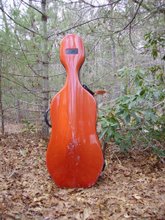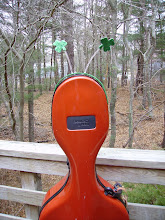I gave my teacher a printout of the article on memory that Erin suggested a while back about why it is not necessary to memorize music. My teacher just laughed. This is not an article she is even vaguely interested in reading.
I've been grumbling about having to perform Suzuki book recitals (all the pieces in the book) from memory. I think I am focusing too much on memory and not enough on technique, intonation, and expression. Either I need to improve my memorizing skills or I need to focus less on memorization.
On the whole, I believe in memorization. I like having a repertoire at my fingertips; and I like performing fiddle tunes, and you can't use sheet music for that. But memory doesn't come easily to me. It requires a lot of analysis and repetition. Then, I tend to be thrown off a bit when I play from memory with others, especially the fiddlers when, sometimes, everyone is playing a slightly different version of the tune.
I tried an experiment a week or two ago. I memorized a fiddle tune, Coleraine, on the flute, to compare the memory process and to see whether it would help or hinder learning the tune on the cello. I memorized it easily the first day, forgot it by the next day, re-memorized it and solidified it over the following few days, and can now play it well. I had never memorized anything on the flute, and it seems to be a very different process than memorizing on a string instrument. When I memorize a fiddle tune on fiddle or cello, I tend to visualize the fingerboard as a grid and think about finger placements on the grid. Most fiddle music on the fiddle is in first position, requiring no shifting, so this works well. Most fiddle music on the cello does require shifting, so it is a little different process. I think about where the shifts are, the bowings, where there is a scale fragment, a fifth, an arpeggio, etc.
With the flute, I found I thought more about note names. No shifts or bowings to worry about, and the pitches are more dependable. It also helped that I could play the tune on the flute--no learning needed, only memory work.
Then I switched to the cello to see if I could play the tune on the cello just from my knowledge of it on the flute. To some degree I could. Curiously I forgot the G#'s that I had focused on in the flute version. Just knowing the tune better helped a lot, though.
Why go through this, you might ask? Well, I have been thinking of memorizing a few fiddle tunes on the flute so I can play flute with the fiddlers on occasion. I have 4 or 5 tunes memorized on the flute now, and have learned several of these on the cello. I think the flute memory work is helpful to memorizing on the cello. At least it does not seem to be detrimental.
As for Suzuki music, I think I will change my focus a little. Instead of memorizing first, polishing second (the Suzuki way), I will concentrate on the learning, intonation, and polishing. I will continue to memorize, and to analyze the music in preparation for memory, but will try not to make memory the major focus of my work. It is not easy to make this transition, but I will try.
Subscribe to:
Post Comments (Atom)












4 comments:
No try - just do.
My string teacher friend said it is good exercise to play a tune on an instrument you are already familiar with and then play the tune on the cello. I haven't tried it, but I suspect it works. I've also heard that if you can sing the tune, it helps you to memorize it.
I am working through the Suzuki books. My teacher has not stressed memorization at all. As I work on each piece, focusing on rhythm, quality, and finally tempo, at some point along the way I'll realize I have it memorized.
My teacher still wants me to practice using the score instead of memory.
Thanks for your thoughts.
This is hard, GTGP; I am so set in my ways!
Marisa, I'm glad to hear that. I know that fiddlers, when learning a new tune by ear, will often sing it after hearing it only once or twice, before playing it. I am so impressed that they can do it, but I think this, too, is a skill that can be learned and gets easier in time. (I once spent months learning and memorizing a complicated fiddle tune. I played it once, and one of the fiddlers then played it with me, having not heard it before.)
Guanaco, I have never met other adult students who intentionally memorize (except students of my teacher, and not all of them do recitals). Also, except for fiddlers, but they are also often playing by ear. So I am still torn between "why should I do this when no one else is doing it--at least to the degree I do it," and "This is just another fun challenge of playing the cello that will make me a better player."
Next Suzuki piece, I will not memorize first! But for now, "polishing" the pieces I am working on, my eyes drift almost immediately from the written page.
Post a Comment